 The world's largest corporate e-voting supplier is about to become even larger. Today, TX-based Premier Election Solutions, the beleaguered and oft-failed voting division of OH-based parent company Diebold, Inc., announced they have been purchased by oft-failed e-voting goliath Election Systems & Software, Inc. (ES&S). The move, if allowed to stand, would "consolidate most U.S. voting under one privately held manufacturer," according to one election watchdog who has announced plans to file an anti-trust complaint concerning the sale with the Department of Justice.
The world's largest corporate e-voting supplier is about to become even larger. Today, TX-based Premier Election Solutions, the beleaguered and oft-failed voting division of OH-based parent company Diebold, Inc., announced they have been purchased by oft-failed e-voting goliath Election Systems & Software, Inc. (ES&S). The move, if allowed to stand, would "consolidate most U.S. voting under one privately held manufacturer," according to one election watchdog who has announced plans to file an anti-trust complaint concerning the sale with the Department of Justice.
Diebold, facing lost money, lost reputation, lost votes and multiple legal battles, has been trying to unload its election division for several years. Having failed at first, the company created an "independent" entity, Premier --- same pig, damned near same lipstick --- in hopes of regaining money and reputation, if not votes. That failed too.
But somehow, as reported today, Diebold was able to convince Nebraska-based ES&S, the nation's largest election company and supplier of 100% unverifiable voting systems, to agree to the purchase.
Diebold says it purchased the election division from Global Election Systems, Inc., for $31 million in 2002. Today, Diebold announced it will sell to ES&S for just $5 million, plus 70% of any cash from outstanding accounts receivable as of August 31.
Unless they've made special arrangements already with Diebold, the people at ES&S --- no stranger to lost votes themselves --- may quickly be saddled with a fair amount of liability from the storied past and continuing failures of Diebold products across the country.
That is, if the acquisition, which is sure to quash any such "competition" in the market which might still exist, is allowed to stand in the first place...
Anti-trust
Shortly after today's announcement, election watchdog organization BlackBoxVoting.org (BBV) announced its intentions to challenge the sale under anti-trust statutes.
BBV founder Bev Harris wrote that "An ES&S/Diebold-Premier acquisition would consolidate most U.S. voting under one privately held manufacturer. And it's not just the concealed vote-counting; these companies now also produce polling place check-in software (electronic pollbooks), voter registration software and vote-by-mail authentication software."
She notes there is precedent for blocking such an acquisition in the U.S. election industry.
"ES&S attempted to consolidate the electronic voting industry in 1997 with a purchase of Business Records Corporation (BRC)," Harris says, "but the purchase was blocked by the US Security and Exchange Commission on antitrust grounds, and the acquisition of BRC was split between ES&S and Sequoia Voting Systems."
Harris noted, in an email follow-up, that the group intends to file first with the Dept. of Justice, and is "looking at options for SEC sanctions next."
She adds that filing a complaint with the DoJ's anti-trust division is not the same as filing a lawsuit, but that she hopes to encourage others to file similar complaints as well.
Of the four major players in the e-voting industry, ES&S already dwarfs all competitors for market share. Diebold/Premiere is the second largest player, followed by the smaller, cash-starved Sequoia Voting Systems, and then Hart-Intercivic.
ES&S' purchase of Diebold/Premier results in a single company, larger than all of their remaining major competitors combined, counting the majority of votes cast in the U.S..
Undermining U.S. Elections
The deal is certain to raise further concerns among the U.S. Election Integrity community whch has, for years, been alarmed by the private take-over of public elections by unaccountable corporations, and the increasing use of secret software used to both cast and tally votes. That takeover was accelerated in 2002, by the passage of the federal Help America Vote Act (HAVA), which pumped some $4 billion dollars into local jurisdictions for so-called "upgrades" of voting systems in the wake of Florida's 2000 Presidential Election debacle.
HAVA was a gold mine for the few private e-voting companies in the U.S., but a disaster for U.S. elections and voters.
Last Summer, election watchdog organization VotersUnite.org's Ellen Theisen released a report titled "Vendors are Undermining the Structure of U.S. Elections" [PDF].
In the report, Theisen (who has guest blogged at The BRAD BLOG on a number of occasions over the years), argued that "the structure of elections in the United States --- once reliant on local representatives accountable to the public --- has become almost wholly dependent on large corporations, which are not accountable to the public."
"If the vendors withdrew their support for elections now," she warned, "our election structure would collapse."
Moreover, as Theisen details in her report, "vendors exploit the local jurisdictions' dependency by charging exorbitant fees, violating laws and ethics, exerting proprietary control over the machinery of elections, and disclaiming unaccountability."
Over the years, ES&S has shown itself, through our own reporting at least, to be amongst the worst of all the major e-voting players when it comes to the exploitation of "local jurisdiction dependency." The xompany has gained a reputation for "charging exorbitant fees" and strong-arming local officials who, as Theisen argues, have allowed themselves to become wholly dependent on their products to run our public elections.
That ability to use heavy-handed tactics will undoubtedly increase, as the options become still fewer for election officials set on using private companies to help carry out their public elections.
Diebold's Liabilities
It's unclear at this time what, if any, of Diebold's existing liabilities ES&S will be forced to absorb in the takeover, and whether existing lawsuits against Diebold/Premier will now be extended to the new owner.
One version of Diebold's optical-scan voting system was recently decertified in California, after it was discovered the company's tabulating system discarded hundreds of ballots without notice. The company, as The BRAD BLOG reported at the time, had long been aware of the software failure in its systems.
A further investigation into the matter revealed that all versions of Diebold's tabulation software, used in some 34 states across the nation, allow for the simple deletion of ballots without notice in the so-called "audit logs," and that those audit logs themselves are not secure, and can be easily deleted or over-written, in violation of federal voting system standards.
The Secretary of State in California is continuing an investigation into versions of Diebold's tabulators which have not yet been decertified, as well as those of other companies, to determine whether there remain additional problems with audit logs in the other systems as well. Those logs have long been pointed to, by voting machine companies and e-voting supporters, as assurance that any problems or tampering could be easily discovered post-election. Unfortunately, it's frequently very difficult, if not impossible, for citizens, and even candidates, to review those logs --- even when they work as they are supposed to.
Diebold itself is still facing a class-action securities fraud lawsuit pertaining, in part, to its election division. Diebold has been under SEC investigation since 2006, a DoJ investigation since 2007, and in 2008, it was forced to admit having overstated earnings.
In a 2007 BRAD BLOG exclusive, we detailed what appeared to be a case of insider trading at the company, when a massive sell-off was carried out by a number of company executives, all on the same day, at a nearly-historic high for the company's stock. Share prices tumbled some 50% almost immediately afterwards, when plans for the "independent" spin-off, Premier, were announced publicly. The insiders sold at $53 per share, and the stock has remained in the $20 and $30 zone largely ever since. Diebold stock closed at $30.69 tonight, jumping 2.2% following today's announcement.
ES&S: A Track Record of Failure
ES&S has faced its own history of failures. These are just a few that we've covered over the years (you can peruse many more on these category pages):
- In the Republican 2006 primary in Pottawattamie County, IA, results of several races were changed after an error in the ES&S optical-scan system was discovered, forcing a hand-count of all elections.
- In the 2006 general election, ES&S touch-screen voting systems in Sarasota, Florida, managed to simply lose some 18,000 votes in a U.S. House election that was decided by just 369.
- In 2006, polling places in eight counties in Arkansas were forced to find alternate voting systems for a scheduled runoff election when they discovered programming errors in the ES&S touch-screen machines.
- In the Summer of 2007, an investigative report by HDNet revealed that ES&S touch-screen systems were built in a Philippine sweatshop, with virtually no quality controls whatsoever. The use of the foreign plant had not been reported to U.S. authorities, as required by law.
- In the 2008 election cycle, ES&S touch-screen voting systems were among the most frequently reported to flip the votes of users while they were trying to cast votes. Reports of such visible vote-flipping --- there is no way to track votes flipped invisibly inside such voting systems --- also surfaced in the 2006 election cycle. In 2008, the states reporting vote-flipping on ES&S touch-screen voting systems included WV, SC, TN, and MO, among others.
- Earlier this year, ES&S agreed to a multi-million dollar settlement with the state of California, after it was discovered it had sold uncertified voting systems in several counties, while representing the systems as federally and state certified. They weren't.
- Also earlier this year, six election officials in Clay County, KY, were arrested after it was discovered that they had been exploiting an interface flaw in ES&S touch-screen systems to change the votes of voters after they thought they had completed casting their votes.


 Sunday 'Close Enough' Toons
Sunday 'Close Enough' Toons A Pretty Weak 'Strongman': 'BradCast' 10/30/25
A Pretty Weak 'Strongman': 'BradCast' 10/30/25 'Green News Report' 10/30/25
'Green News Report' 10/30/25
 Proposal for 'First Politically Viable Wealth Tax' Takes Shape in CA: 'BradCast' 10/29/25
Proposal for 'First Politically Viable Wealth Tax' Takes Shape in CA: 'BradCast' 10/29/25 Monster Storm, Endless Wars, Gamed Elections:
Monster Storm, Endless Wars, Gamed Elections: 'Green News Report' 10/28/25
'Green News Report' 10/28/25 Let's Play 'Who Wants
Let's Play 'Who Wants Sunday 'Cartoonists Dilemma' Toons
Sunday 'Cartoonists Dilemma' Toons Exiled NOAA Scientists Resurrect Critical Disaster Database: 'BradCast' 10/23/25
Exiled NOAA Scientists Resurrect Critical Disaster Database: 'BradCast' 10/23/25  'Green News Report' 10/23/25
'Green News Report' 10/23/25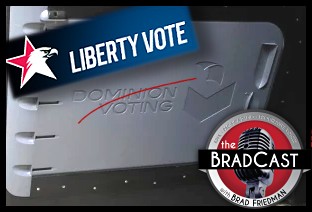 Trump-Allied GOP Partisan Buys Dominion Voting Systems: 'BradCast' 10/22/25
Trump-Allied GOP Partisan Buys Dominion Voting Systems: 'BradCast' 10/22/25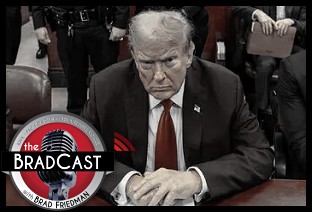 Trump, Republican Law(lessness) & (Dis)Order: 'BradCast' 10/21/25
Trump, Republican Law(lessness) & (Dis)Order: 'BradCast' 10/21/25 'Green News Report' 10/21/25
'Green News Report' 10/21/25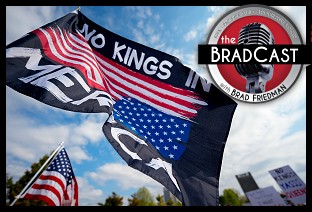 Celebrating 'No Kings': 'BradCast' 10/20/25
Celebrating 'No Kings': 'BradCast' 10/20/25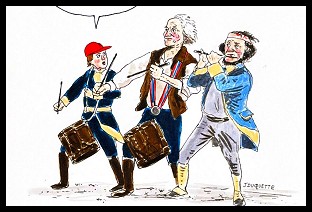 Sunday 'How It Started' Toons
Sunday 'How It Started' Toons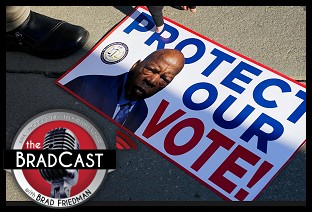 SCOTUS Repubs Appear Ready to Gut Rest of Voting Rights Act: 'BradCast' 10/16/25
SCOTUS Repubs Appear Ready to Gut Rest of Voting Rights Act: 'BradCast' 10/16/25 'Green News Report' 10/16/25
'Green News Report' 10/16/25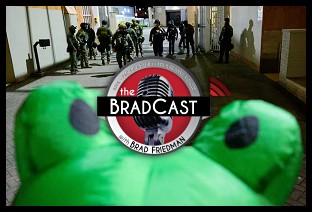 The 'Epstein Shutdown' and Other Autocratic Nightmares: 'BradCast' 10/15/25
The 'Epstein Shutdown' and Other Autocratic Nightmares: 'BradCast' 10/15/25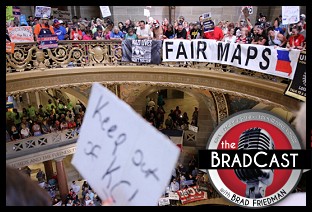 Group Vows to Block MO's GOP U.S. House Gerrymander: 'BradCast' 10/14/25
Group Vows to Block MO's GOP U.S. House Gerrymander: 'BradCast' 10/14/25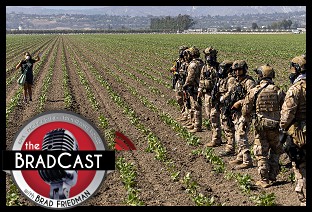 Trump Labor Dept. Warns Trump Policies Sparking Food Crisis: 'BradCast' 10/9/25
Trump Labor Dept. Warns Trump Policies Sparking Food Crisis: 'BradCast' 10/9/25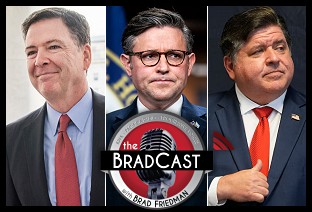 Trump's Losing Battles: 'BradCast' 10/8/25
Trump's Losing Battles: 'BradCast' 10/8/25 Trump, Roberts and His Stacked, Packed and Captured SCOTUS: 'BradCast' 10/7/25
Trump, Roberts and His Stacked, Packed and Captured SCOTUS: 'BradCast' 10/7/25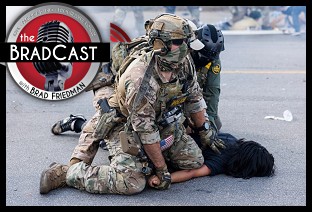 Trump Attempting His 'Invasion from Within': 'BradCast' 10/6/25
Trump Attempting His 'Invasion from Within': 'BradCast' 10/6/25 Biden Budget Expert: Mass Firings in Shutdown 'Illegal': 'BradCast' 10/2/25
Biden Budget Expert: Mass Firings in Shutdown 'Illegal': 'BradCast' 10/2/25 Why is DOJ Suing 'Blue' States for Their Voter Databases?: 'BradCast' 10/1/25
Why is DOJ Suing 'Blue' States for Their Voter Databases?: 'BradCast' 10/1/25
 VA GOP VOTER REG FRAUDSTER OFF HOOK
VA GOP VOTER REG FRAUDSTER OFF HOOK Criminal GOP Voter Registration Fraud Probe Expanding in VA
Criminal GOP Voter Registration Fraud Probe Expanding in VA DOJ PROBE SOUGHT AFTER VA ARREST
DOJ PROBE SOUGHT AFTER VA ARREST Arrest in VA: GOP Voter Reg Scandal Widens
Arrest in VA: GOP Voter Reg Scandal Widens ALL TOGETHER: ROVE, SPROUL, KOCHS, RNC
ALL TOGETHER: ROVE, SPROUL, KOCHS, RNC LATimes: RNC's 'Fired' Sproul Working for Repubs in 'as Many as 30 States'
LATimes: RNC's 'Fired' Sproul Working for Repubs in 'as Many as 30 States' 'Fired' Sproul Group 'Cloned', Still Working for Republicans in At Least 10 States
'Fired' Sproul Group 'Cloned', Still Working for Republicans in At Least 10 States FINALLY: FOX ON GOP REG FRAUD SCANDAL
FINALLY: FOX ON GOP REG FRAUD SCANDAL COLORADO FOLLOWS FLORIDA WITH GOP CRIMINAL INVESTIGATION
COLORADO FOLLOWS FLORIDA WITH GOP CRIMINAL INVESTIGATION CRIMINAL PROBE LAUNCHED INTO GOP VOTER REGISTRATION FRAUD SCANDAL IN FL
CRIMINAL PROBE LAUNCHED INTO GOP VOTER REGISTRATION FRAUD SCANDAL IN FL Brad Breaks PA Photo ID & GOP Registration Fraud Scandal News on Hartmann TV
Brad Breaks PA Photo ID & GOP Registration Fraud Scandal News on Hartmann TV  CAUGHT ON TAPE: COORDINATED NATIONWIDE GOP VOTER REG SCAM
CAUGHT ON TAPE: COORDINATED NATIONWIDE GOP VOTER REG SCAM CRIMINAL ELECTION FRAUD COMPLAINT FILED AGAINST GOP 'FRAUD' FIRM
CRIMINAL ELECTION FRAUD COMPLAINT FILED AGAINST GOP 'FRAUD' FIRM RICK SCOTT GETS ROLLED IN GOP REGISTRATION FRAUD SCANDAL
RICK SCOTT GETS ROLLED IN GOP REGISTRATION FRAUD SCANDAL VIDEO: Brad Breaks GOP Reg Fraud Scandal on Hartmann TV
VIDEO: Brad Breaks GOP Reg Fraud Scandal on Hartmann TV RNC FIRES NATIONAL VOTER REGISTRATION FIRM FOR FRAUD
RNC FIRES NATIONAL VOTER REGISTRATION FIRM FOR FRAUD EXCLUSIVE: Intvw w/ FL Official Who First Discovered GOP Reg Fraud
EXCLUSIVE: Intvw w/ FL Official Who First Discovered GOP Reg Fraud GOP REGISTRATION FRAUD FOUND IN FL
GOP REGISTRATION FRAUD FOUND IN FL

































